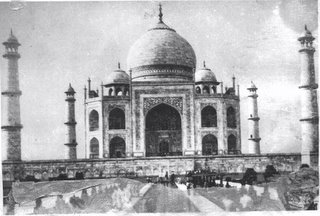Travel to the city of London happened at a blink of an eye. At a short notice of 4 days, I was conveyed about my overseas trip. On a lovely Friday afternoon in Bombay when we were preparing for my sister's night-flight to US, my cell buzz zed and it was none other than my senior, who intimated me of the urgent travel requirement to UK, for next Wednesday.
I was stunned at the news, even though I had a very faint idea about the subject. This being my first overseas travel, I had to start from the tail-end of purchasing my baggage, as well. There was an overhead of purchasing new suits, ties, blazers, etc. as they form mandatory part of the attire, while working at HQ office. Within 2 days I completed my priority shopping, and rest of the list was left with my parents.
Monday morning I had to travel back to Pune to collect tickets and other relevant data and documents. These helter-skelter made me fall sick, as I hardly slept or ate anything. By the time I reached Pune, I was engraved in perfect cold and fever. Things in Pune were not easy. Completing long travel formalities, segregating and packaging my luggage and data clean-up from my PC, made life worse. There was an added UK airport requirement of chest x-ray too. Most of my time and energy was consumed, and by the time I reached Mumbai (Home), it was already 11pm, Tuesday night.
On the way, back to Bombay, I text messaged my news of travel, to all near and dears. Some called back, while some messaged back and some even made to my home by 11:30 pm. I was supposed to take a 'British Airways' flight scheduled to take-off at 1:00 pm next day, on Wednesday. As I was deadly tired and was suffering from high cold and fever, I decided to take some rest before getting onto final packaging and set my alarm to 3:30 am.
Starting at 3:30 in the morning got everything together. Packing went for 4 long hours which included arranging clothes, spices, initial food, etc. As usual weight of the luggage exceeded the permitted 23 kgs. This lead to packing and unpacking, most of the time, reaching trade-offs. My parents accompanied me to the airport. When leaving home it was dry and sunny, but soon the rains took over. Though, airport is at a 30 minutes drive from my home, it took us 1.5 hrs to reach. Finally, finding my way through the morning traffic and rains, checked-in at the airport at 10:30 am. Parents waited until security check was completed.
Rest of the experience will be continued in Part II.
